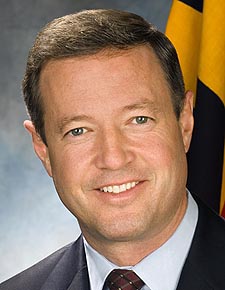
Governor Declares “Day of Service”
 Governor Martin O’Malley has officially declared September 29 an interfaith Day of Service calling on all Marylanders to engage in community service projects focused on ending hunger and protecting the environment.
Governor Martin O’Malley has officially declared September 29 an interfaith Day of Service calling on all Marylanders to engage in community service projects focused on ending hunger and protecting the environment.
Building on Governor O’Malley’s strategic goals of eradicating childhood hunger by 2015, and restoring the health of the Chesapeake Bay by 2025, the activities planned for the day of service will all move the State forward in reaching these goals. The interfaith Day of Service is a regional effort by the states of Maryland, West Virginia, Virginia, and the District of Columbia. The Day of Service will bring nonprofit organizations and religious groups – churches, youth groups, and religious affiliated schools – to recruit members and supporters to participate in the day of service in their area.
“Throughout the final weekend in September, we’ll be coming together as a community – as Marylanders and Virginians, West Virginians and Washingtonians, as members of many great and diverse faiths – to harness the incredible power of community,” said O’Malley. “We are asking all our fellow citizens to us join in service the last weekend in September – and really throughout the month – in service to combat hunger, in service to protect and restore our environment, and in service that recognizes the connections between the health of our people, and the health of our land, water and air. I appreciate the commitment of Elder Jack Gerard of the Church of Jesus Christ of Latter Day Saints in assisting us with our efforts and bringing together our partners in the other states for this very important community service initiative.”
The Day of Service includes partners from the business, nonprofit and faith community. The Chesapeake Bay Foundation (CBF) will be supplying small tubed trees for groups to plant and will be available at their Clagett Farm site in Upper Marlboro. CBF will also have resources for individual volunteers to work on harvesting crops on the farm that can then be donated to food banks in the area. The Chesapeake Bay Trust will be offering mini-grants of up to $500 to nonprofits to do tree plantings, other native plantings, or stream clean-ups either on their properties or in their neighborhoods. The Baltimore Community Tool Bank will offer an inventory of tools—shovels, rakes, drills and more to assist nonprofit organizations, religious and educational institutions, community groups and their volunteers in their community projects. Ocean Conservancy International Coastal Cleanup will be available to assist faith-based organizations with identifying streams or rivers in need of organized clean-ups. The Maryland Department of Natural Resources’ TREE-Mendous Maryland program allows organizations to have native trees planted in Honor or Memory of family and friends, to celebrate Holidays, birthdays, and to observe other special occasions. TREE-Mendous Maryland will arrange for trees to be planted in Maryland in the county in which the recipient of the certificate lives. Marylanders Plant Trees is another project at DNR that supplies coupons to citizens for $25 off the purchase of a native tree at 86 participating nurseries across the State.
The O’Malley-Brown Administration has a set of 15 strategic policy goals
The Governor’s Office is asking our interfaith partners to identify activities that their churches, synagogues or mosques already administer that fit within the two goals of ending childhood hunger and protecting the environment that could use volunteers for the day. County volunteer centers will be asked to help promote the day of service in their county and the Governor’s Ethnic Commissions and Commission on Service and Volunteerism will also be asked to play a major role in seeking out opportunities for service, and in spreading the word to engage volunteers in their communities. A centralized Day to Serve website has been set up – www.daytoserve.org

Engage us on Facebook
Follow us on Twitter
Tweets by @mymcmedia